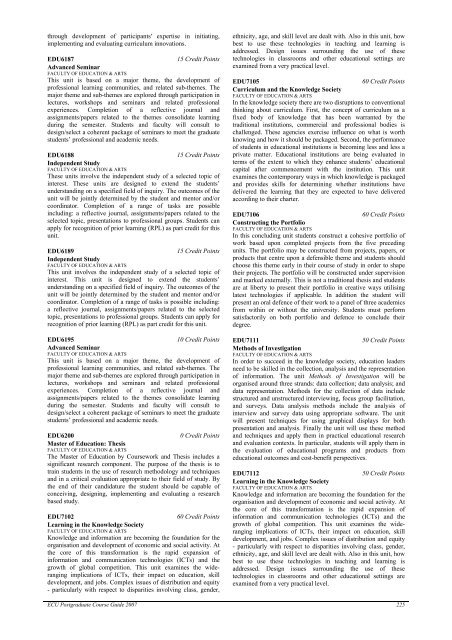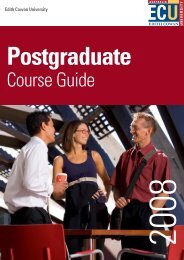Course Guide - Edith Cowan University
Course Guide - Edith Cowan University
Course Guide - Edith Cowan University
Create successful ePaper yourself
Turn your PDF publications into a flip-book with our unique Google optimized e-Paper software.
through development of participants' expertise in initiating,<br />
implementing and evaluating curriculum innovations.<br />
EDU6187<br />
15 Credit Points<br />
Advanced Seminar<br />
FACULTY OF EDUCATION & ARTS<br />
This unit is based on a major theme, the development of<br />
professional learning communities, and related sub-themes. The<br />
major theme and sub-themes are explored through participation in<br />
lectures, workshops and seminars and related professional<br />
experiences. Completion of a reflective journal and<br />
assignments/papers related to the themes consolidate learning<br />
during the semester. Students and faculty will consult to<br />
design/select a coherent package of seminars to meet the graduate<br />
students’ professional and academic needs.<br />
EDU6188<br />
15 Credit Points<br />
Independent Study<br />
FACULTY OF EDUCATION & ARTS<br />
These units involve the independent study of a selected topic of<br />
interest. These units are designed to extend the students’<br />
understanding on a specified field of inquiry. The outcomes of the<br />
unit will be jointly determined by the student and mentor and/or<br />
coordinator. Completion of a range of tasks are possible<br />
including: a reflective journal, assignments/papers related to the<br />
selected topic, presentations to professional groups. Students can<br />
apply for recognition of prior learning (RPL) as part credit for this<br />
unit.<br />
EDU6189<br />
15 Credit Points<br />
Independent Study<br />
FACULTY OF EDUCATION & ARTS<br />
This unit involves the independent study of a selected topic of<br />
interest. This unit is designed to extend the students’<br />
understanding on a specified field of inquiry. The outcomes of the<br />
unit will be jointly determined by the student and mentor and/or<br />
coordinator. Completion of a range of tasks is possible including:<br />
a reflective journal, assignments/papers related to the selected<br />
topic, presentations to professional groups. Students can apply for<br />
recognition of prior learning (RPL) as part credit for this unit.<br />
EDU6195<br />
10 Credit Points<br />
Advanced Seminar<br />
FACULTY OF EDUCATION & ARTS<br />
This unit is based on a major theme, the development of<br />
professional learning communities, and related sub-themes. The<br />
major theme and sub-themes are explored through participation in<br />
lectures, workshops and seminars and related professional<br />
experiences. Completion of a reflective journal and<br />
assignments/papers related to the themes consolidate learning<br />
during the semester. Students and faculty will consult to<br />
design/select a coherent package of seminars to meet the graduate<br />
students’ professional and academic needs.<br />
EDU6200<br />
0 Credit Points<br />
Master of Education: Thesis<br />
FACULTY OF EDUCATION & ARTS<br />
The Master of Education by <strong>Course</strong>work and Thesis includes a<br />
significant research component. The purpose of the thesis is to<br />
train students in the use of research methodology and techniques<br />
and in a critical evaluation appropriate to their field of study. By<br />
the end of their candidature the student should be capable of<br />
conceiving, designing, implementing and evaluating a research<br />
based study.<br />
EDU7102<br />
60 Credit Points<br />
Learning in the Knowledge Society<br />
FACULTY OF EDUCATION & ARTS<br />
Knowledge and information are becoming the foundation for the<br />
organisation and development of economic and social activity. At<br />
the core of this transformation is the rapid expansion of<br />
information and communication technologies (ICTs) and the<br />
growth of global competition. This unit examines the wideranging<br />
implications of ICTs, their impact on education, skill<br />
development, and jobs. Complex issues of distribution and equity<br />
- particularly with respect to disparities involving class, gender,<br />
ethnicity, age, and skill level are dealt with. Also in this unit, how<br />
best to use these technologies in teaching and learning is<br />
addressed. Design issues surrounding the use of these<br />
technologies in classrooms and other educational settings are<br />
examined from a very practical level.<br />
EDU7105<br />
60 Credit Points<br />
Curriculum and the Knowledge Society<br />
FACULTY OF EDUCATION & ARTS<br />
In the knowledge society there are two disruptions to conventional<br />
thinking about curriculum. First, the concept of curriculum as a<br />
fixed body of knowledge that has been warranted by the<br />
traditional institutions, commercial and professional bodies is<br />
challenged. These agencies exercise influence on what is worth<br />
knowing and how it should be packaged. Second, the performance<br />
of students in educational institutions is becoming less and less a<br />
private matter. Educational institutions are being evaluated in<br />
terms of the extent to which they enhance students’ educational<br />
capital after commencement with the institution. This unit<br />
examines the contemporary ways in which knowledge is packaged<br />
and provides skills for determining whether institutions have<br />
delivered the learning that they are expected to have delivered<br />
according to their charter.<br />
EDU7106<br />
60 Credit Points<br />
Constructing the Portfolio<br />
FACULTY OF EDUCATION & ARTS<br />
In this concluding unit students construct a cohesive portfolio of<br />
work based upon completed projects from the five preceding<br />
units. The portfolio may be constructed from projects, papers, or<br />
products that centre upon a defensible theme and students should<br />
choose this theme early in their course of study in order to shape<br />
their projects. The portfolio will be constructed under supervision<br />
and marked externally. This is not a traditional thesis and students<br />
are at liberty to present their portfolio in creative ways utilising<br />
latest technologies if applicable. In addition the student will<br />
present an oral defence of their work to a panel of three academics<br />
from within or without the university. Students must perform<br />
satisfactorily on both portfolio and defence to conclude their<br />
degree.<br />
EDU7111<br />
50 Credit Points<br />
Methods of Investigation<br />
FACULTY OF EDUCATION & ARTS<br />
In order to succeed in the knowledge society, education leaders<br />
need to be skilled in the collection, analysis and the representation<br />
of information. The unit Methods of Investigation will be<br />
organised around three strands: data collection; data analysis; and<br />
data representation. Methods for the collection of data include<br />
structured and unstructured interviewing, focus group facilitation,<br />
and surveys. Data analysis methods include the analysis of<br />
interview and survey data using appropriate software. The unit<br />
will present techniques for using graphical displays for both<br />
presentation and analysis. Finally the unit will use these method<br />
and techniques and apply them in practical educational research<br />
and evaluation contexts. In particular, students will apply them in<br />
the evaluation of educational programs and products from<br />
educational outcomes and cost-benefit perspectives.<br />
EDU7112<br />
50 Credit Points<br />
Learning in the Knowledge Society<br />
FACULTY OF EDUCATION & ARTS<br />
Knowledge and information are becoming the foundation for the<br />
organisation and development of economic and social activity. At<br />
the core of this transformation is the rapid expansion of<br />
information and communication technologies (ICTs) and the<br />
growth of global competition. This unit examines the wideranging<br />
implications of ICTs, their impact on education, skill<br />
development, and jobs. Complex issues of distribution and equity<br />
- particularly with respect to disparities involving class, gender,<br />
ethnicity, age, and skill level are dealt with. Also in this unit, how<br />
best to use these technologies in teaching and learning is<br />
addressed. Design issues surrounding the use of these<br />
technologies in classrooms and other educational settings are<br />
examined from a very practical level.<br />
ECU Postgraduate <strong>Course</strong> <strong>Guide</strong> 2007 225



